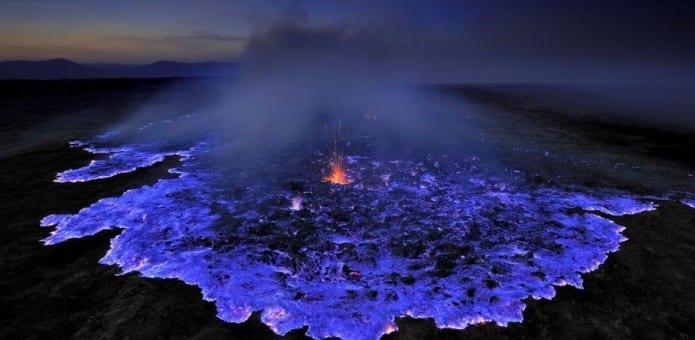See This Stunning Electric-Blue Molten Streams From A Volcano in Indonesia
Though in strict sense this cant be called a lava, Kawah Ijen spouts this beautiful sight to behold. Kawah Ijen is a volcano that erupted in East Java, Indonesia displaying its unique electric blue molten streams for the world.
Luckily, Chicago-based photographer Reuben Wu was there to photograph it. Though the electric blue streams seems out of this world, its look can be easily explained by those who have come into contact with it most.
Paris-based photographer Olivier Grunewald was one of the first to document the lava with his photographs, it isn’t really lava at all. “This blue glow—unusual for a volcano—isn’t, of course, lava, as unfortunately can be read on many websites,” Grunewald explained to National Geographic in an email.

He explains that the electric blue glow is caused by a combustion of sulfuric gases. The gases emerge from cracks at the base of Kawah Ijen called fumaroles at high pressure and a temperature of up to 1,112 degrees Fahrenheit. When the gases come into contact with the air, they ignite, shooting flames as high as 16 feet.
Some of the gases then condense into liquid sulfur, which, as Grunewald explains “continues to burn as it flows down the slopes, giving the feeling of lava flowing.”
So, in reality, it is liquid sulfur that is responsible for such a beautiful spectacle. The base of Kawah Ijen from which the gases emerge is called the Blue Fire Crater.

Grunewald says that Kawah Ijen itself is just one volcano within a larger Ijen volcano complex.
The Ijen are a collection of what are called stratovolcanoes, which are basically tall, steep volcanoes that are up of alternating layers of ash and lava. They are contained within a caldera, an area of land that has collapsed due to previous volcanic eruption. The Ijen caldera is huge, at about 12.5 miles wide. The highest peak in the Ijen volcano complex is called Gunung Merapi, which translates aptly into “Mountain of Fire” in the Indonesian language.
Apparently, the electric blue liquid sulfur of Kawah Ijen isn’t any secret any longer. Ever since it was made famous by the National Geographic, Kawah Ijen has been flocked by tourists.

